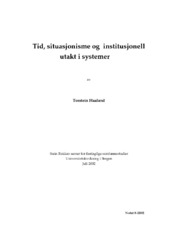| dc.contributor.author | Haaland, Torstein | eng |
| dc.date.accessioned | 2006-06-22T09:17:25Z | |
| dc.date.accessioned | 2020-12-10T06:31:38Z | |
| dc.date.available | 2006-06-22T09:17:25Z | |
| dc.date.available | 2020-12-10T06:31:38Z | |
| dc.date.issued | 2002-07 | eng |
| dc.identifier.issn | 1503-0946 | |
| dc.identifier.uri | https://hdl.handle.net/1956/1436 | |
| dc.description.abstract | Time, Situationalism and Institutional Asynchronism in Systems: The article discuss the relationship between time and situationalism, institutions and systems, with the classic question of social change as an undercurrent trough the text. I start with outlining time as a methodological category, and then discuss situationalism as a alternative to invidualism and collectivism. Situationalism is shown as way to handle the structure-actor-problem: By coping with this problem in either a reductionistic (Weber/Durkheim) or relationistic way (Bourdieu/ Giddens), one has created a hen-and-chicken problem that cant be solved within the problems frame. To go beyond hens and chickens we need to focus on the context of the historical situation. Here the author presents his own position – historical situationalism. Against this backdrop, the methodology of institutional asynchronism in systems is presented as an elaboration on the idea of cultural lag by sociologist William F. Ogburn. Historical systems are shown as open and situational, where institusjonal asynchronism determines social change and stability. Integration in time-systems are determined by the level of asynchronism between institutions; the more extensive it is, the better chance of social change. The direction of change is determined by the most dominant institution in the system, with others in cultural lag. The logic of change is based on a response-mechanism, where the proactive institution(s) gives impulses to the reactive institution(s). It is also pointed out, that the role of proactive/ reactive institutions may change over time; an institutions that was leading the way in one historical situation, could become an obstacle for social change in a different situation. The human-historical system consists of individual elements capable learning based on experience and intuitive improvisation. Institutions in this system are at different levels of development and interact in chaos-dynamics, where the terms are irreversible and in constant change. The methodology of institutional asynchronism in systems is tried out on different topics; Luhmann's systems theory, and (new) institutional theory. Its pointed out that Luhmann's theory is unsatisfactory as a theory of historical systems. Luhmann regards systems first and foremost as closed and self-contained – whereas historical systems are open and dependent on outside factors. When it comes to institutional theory, the author has two suggestions: First, the institutional theory needs to bring more clarity to its relationship to time/situationalism. Secondly, it must develop further a systems perspective. The article concludes by discussing a possible historical turn in the social sciences. | en_US |
| dc.description.abstract | «Tid, situasjonisme og institusjonell utakt i systemer», tar opp spørsmålet om sosial endring der «tid», «situasjonisme», «institusjon» og «system» er de sentrale stikkord. Her koples situasjonisme til metodologien om institusjonell utakt i systemer. Tidsbestemte systemer utlegges som åpne og situasjonistiske, hvor sosial endring og stabilitet betinges av institusjonell utakt: Systemintegrasjon/desintegrasjon er gitt ut fra graden av institusjonell synkronisitet. Jo svakere den er, jo større sjanse for sosial endring. Endringsretningen i systemet angis av den mest dominerende institusjon i systemet, med de andre i etterslep. Endringslogikken bygger på en responsmekanisme. Forfatteren er her inspirert av den amerikanske sosiolog William F. Ogburn, som myntet begrepet «kulturelt etterslep». | no |
| dc.format.extent | 85320 bytes | eng |
| dc.format.mimetype | application/pdf | eng |
| dc.language.iso | nob | eng |
| dc.publisher | Stein Rokkan Centre for Social Studies | eng |
| dc.relation.ispartofseries | 8-2002 | |
| dc.relation.ispartofseries | Notat | no |
| dc.title | Tid, situasjonisme og institusjonell utakt i systemer | nob |
| dc.type | Working paper | eng |
| dc.subject.nsi | VDP::Samfunnsvitenskap: 200 | nob |
